2018学年高二英语译林版选修6教学案:Unit 3 Section 2 Word版含答案
高二英语译林版选修6教案:Unit3 阅读1 含解析 精品
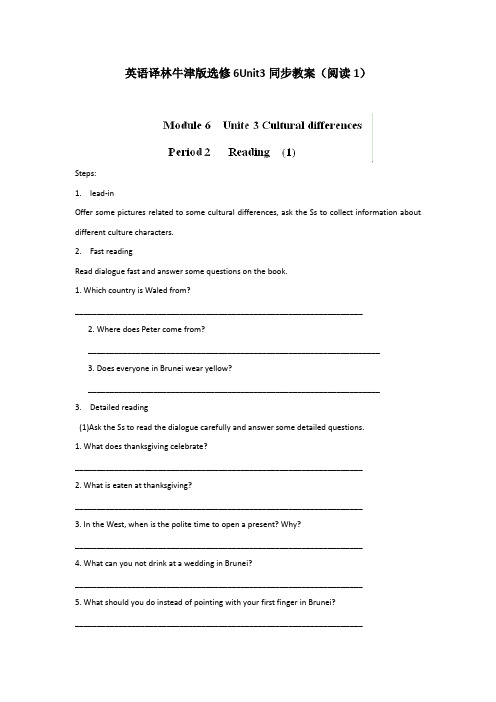
英语译林牛津版选修6Unit3同步教案(阅读1)Steps:1.lead-inOffer some pictures related to some cultural differences, ask the Ss to collect information about different culture characters.2.Fast readingRead dialogue fast and answer some questions on the book.1. Which country is Waled from?__________________________________________________________________2. Where does Peter come from?___________________________________________________________________3. Does everyone in Brunei wear yellow?___________________________________________________________________3.Detailed reading(1)Ask the Ss to read the dialogue carefully and answer some detailed questions.1. What does thanksgiving celebrate?__________________________________________________________________2. What is eaten at thanksgiving?__________________________________________________________________3. In the West, when is the polite time to open a present? Why?__________________________________________________________________4. What can you not drink at a wedding in Brunei?__________________________________________________________________5. What should you do instead of pointing with your first finger in Brunei?__________________________________________________________________6. What customs do Chinese cities and Brunei have in common?___________________________________________________________________(2) The chat room dialogue outlines differences between cultures, put the subjects of the dialogue in the correct order. Write 1 to 7 in the blanks.Weddings _____ Presents _____ Shoes _____USA/UK cultural differences _____ An American celebration ______Colour of clothing ______Pointing _______Ask the students to read the article again, do the exercises below.1.In Waled’s opinion, the American teacher at his school is quite interested in _____.A.talking about the gifts that they often receive from others.B.talking about the custom of the Thanksgiving Day.C.talking about the cultural differences between America and Britain.D.making lectures about the cultural differences between the US and the UK.2.The Bruneians intend to ________.A.provide alcohol and soft drinks in the wedding ceremony.B.Give guests presents as a souvenirC.See the people’s reaction when giving presents to them.D.Hold an exciting and unique wedding ceremony3.In Italy, guests attending a wedding are expected to _______A.give the newly-weds presentsB.receive presents from the newly-wedsC.sit with the bridegroom and the other menD.sit with the bride and the other women4.According to this text, fill in the blank with the correct word, only one word in each blank.。
高二英语教案:高二英语选修6 Unit3 教案3

教案5 Unit3 A healthy lifeListeningTeaching goalsEnable the students to listen for details and catch the specific information as much as possible.Learning ability goalsEnable the students to predict some important information in the process of listening and encourage the students to talk about the situations according to the listening materials.Teaching important and difficult pointsHow to make sure the answers of listening material.Teaching aidsA recorder and cassette tapes, a projector, and a computerTeaching proceduresStep 1 Warming up1. Are there any discos, karaoke bars or nightclubs in your district for young people to goto?2. Have you ever been to places like these?3. Do you ever go to parties with your friends?4. Do you think it is OK for alcohol to be available at places whe re young people meet?Step 2 Pre-listeningThe listening is a conversation between Tina and Sara about going to adisco.Let’s predict: What kind of advise will Tina give to Sara?Step 3 Listening1)Listen to the tape and tick the things Sara is worried about.1. drugs2. smoking3. alcohol4. dancing2)Listen to the tape again and complete Tina’s sentences.1. Just say no. You don’t have to do anything you don’t want to.2. It is ok to drink orange juice or something instead.3. It would be a good idea to have something to eat before you go out, like rice or noodles.4. If someone offers you a cigarette, don’t take it.5. Well, you’ll have to learn. Let’s get my CD player and I’ll teach you.Step 4 Listening on page 581) Listen to the tape and fill in the chart belowMedical chartName: Li YueAge: 18Occupation:studentToday’s date: _________Symptoms: headaches, tired all the time, not sleeping and eating wellPossible problem: stressProposed action:1. Do some tests to make sure there is nothing seriously wrong2. Discuss ways to relaxStep 5 Listening task1) Read the questions below and then listen to the tape to find t heanswers.1. What is the topic of Li Yue’s talk?2. Summarize Li Yue’s talk in one sentence.2) Listen to Li Yue’s talk again and complete these sentences.1. It’s OK to ____________.2. Be careful of _________________.3. You also ___________ a balance in your life.4. If you _________________ to relax and enjoy yourself, you canbecome _______________________________.5. You ______________ your study time with rest times.6. You need to _____________. You _______ keep in touch with friends and to________ _____________.7. So, my advice to you today is to____________ ________your p hysical and mental health as well as your schoolwork.8. Just ______________ a day to ____________ ________________ _____________________ ________.9. Take _______ occasionally to _______ film, _________in the co untry or ___ hiking.Keys: 1.worry a little 2.worrying too much 3.have to keep4. don’t take time out; stressed and stress leads to ill health5. have to balance6.have some sun; need to; get some exercis e7. think carefully about 8.take 30 minutes; get some fresh air, doa little exercise or meet with friends 9.time out; go to a; take a bike ride;go3) Listen once more and then answer these questions.1. How long ago did Li Yue leave school?Two years.2. What is she doing now?She is studying at university.3. Why did Li Yue s ay to the students “I can see by your faces t hat youare all doing very well at school and that none of you are worried about the coming exams?”(Sample answer)Li Yue is making a joke to entertain the audience and keep them interested in her talk.4. Why is Li Yue a good person to give this talk to the students? Give at least two reasons.Li Yue suffered stress herself so she knows what can cause stress andshe knows how to prevent it. She is not much older than the stu dents soshe is a good role model.5. What does Li Yue say could happen if you study all the time without a break?You could become stressed, which often leads to ill health.6. List five things Li Yue suggests students could do to relax. Take 30 minutes a day to get some fresh air; get some exercise; meetwith friends; go to a film occasionally; take a bike ride in the cou ntry;go hiking.Step 6 HomeworkRead the listening materials and pay attention to some key points.。
高二英语译林版选修6教学案Unit 3 Section 2 Word版含答案
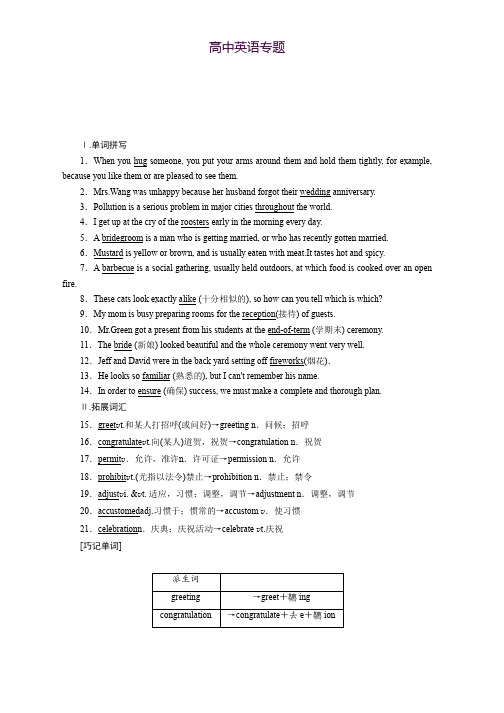
Ⅰ.单词拼写1.When you hug someone, you put your arms around them and hold them tightly, for example, because you like them or are pleased to see them.2.Mrs.Wang was unhappy because her husband forgot their wedding anniversary.3.Pollution is a serious problem in major cities throughout the world.4.I get up at the cry of the roosters early in the morning every day.5.A bridegroom is a man who is getting married, or who has recently gotten married.6.Mustard is yellow or brown, and is usually eaten with meat.It tastes hot and spicy.7.A barbecue is a social gathering, usually held outdoors, at which food is cooked over an open fire.8.These cats look exactly alike (十分相似的), so how can you tell which is which?9.My mom is busy preparing rooms for the reception(接待) of guests.10.Mr.Green got a present from his students at the end-of-term (学期末) ceremony.11.The bride (新娘) looked beautiful and the whole ceremony went very well.12.Jeff and David were in the back yard setting off fireworks(烟花).13.He looks so familiar (熟悉的), but I can't remember his name.14.In order to ensure (确保) success, we must make a complete and thorough plan.Ⅱ.拓展词汇15.greet v t.和某人打招呼(或问好)→greeting n.问候;招呼16.congratulate v t.向(某人)道贺,祝贺→congratulation n.祝贺17.permit v.允许,准许n.许可证→permission n.允许18.prohibit v t.(尤指以法令)禁止→prohibition n.禁止;禁令19.adjust v i. &v t. 适应,习惯;调整,调节→adjustment n.调整,调节20.accustomed adj.习惯于;惯常的→accustom v.使习惯21.celebration n.庆典;庆祝活动→celebrate v t.庆祝[巧记单词]→greet+ing→congratulate+去e+ion→adjust+mentⅢ.补全短语1.adjust to 适应2.get/be/become accustomed to习惯于3.be familiar with通晓;熟悉4.be amazed at对……感到吃惊5.take off脱下,除掉;起飞6.be similar to与……相似7.on the one hand 一方面8.do without设法对付过去;没有……也行9.share/have sth. in common 有共同点10.set off燃放1.[教材原句]Roosters are supposed to drive bad spirits away from the wedding ceremony, and hens are thought to ensure good luck for the marriage.公鸡被认为能够把坏运气从婚礼上赶走,而母鸡被认为能保证给婚姻带来好运。
高二英语译林版选修6教案:Unit2(task)含解析
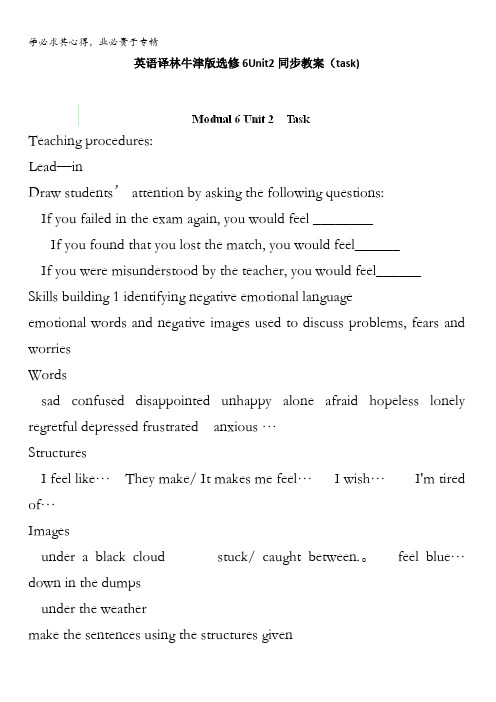
英语译林牛津版选修6Unit2同步教案(task)Teaching procedures:Lead—inDraw students’ attention by asking the following questions:If you failed in the exam again, you would feel ________If you found that you lost the match, you would feel______If you were misunderstood by the teacher, you would feel______Skills building 1 identifying negative emotional languageemotional words and negative images used to discuss problems, fears and worriesWordssad confused disappointed unhappy alone afraid hopeless lonely regretful depressed frustrated anxious …StructuresI feel like…They make/ It makes me feel…I wish…I'm tired of…Imagesunder a black cloud stuck/ caught between.。
feel blue…down in the dumpsunder the weathermake the sentences using the structures givenI felt like crying when I knew I would never see my grandma again. Failing my Maths test again made me feel rather depressed。
高二英语译林版选修6教案:Unit3 power 含解析 精品
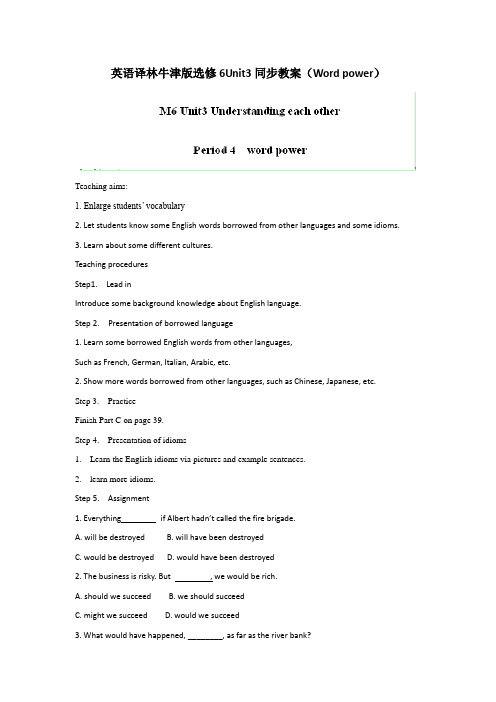
英语译林牛津版选修6Unit3同步教案(Word power)Teaching aims:1. Enlarge students’ vocabulary2. Let students know some English words borrowed from other languages and some idioms.3. Learn about some different cultures.Teaching proceduresStep1. Lead inIntroduce some background knowledge about English language.Step 2. Presentation of borrowed language1. Learn some borrowed English words from other languages,Such as French, German, Italian, Arabic, etc.2. Show more words borrowed from other languages, such as Chinese, Japanese, etc.Step 3. PracticeFinish Part C on page 39.Step 4. Presentation of idioms1.Learn the English idioms via pictures and example sentences.2.learn more idioms.Step 5. Assignment1. Everything if Albert hadn’t called the f ire brigade.A. will be destroyedB. will have been destroyedC. would be destroyedD. would have been destroyed2. The business is risky. But , we would be rich.A. should we succeedB. we should succeedC. might we succeedD. would we succeed3. What would have happened, ________, as far as the river bank?A. Bob had walked fartherB. if Bob should walk fartherC. had Bob walked fartherD. if Bob walked farther4. I _____ you some money, but I hadn’t any on me then.A. would lendB. would have lentC. could lendD. may have lent5. ______ today, he would get there by Friday.A. Was he leavingB. if he leavesC. Were he to leaveD. if he is leaving6. Supposing this ship ,do you think there would be enough life jackets for all the passengers?A. were to sinkB. has sunkC. was sinkingD. sunk7. I don’t think he’ll attend the party, and ______ he attend it, what would he wear?A. wereB. hadC. didD. should8. —— My boss often made me work day and night.—— If I _____ you, I ______ the job.A. am, will give upB. had been, would have given upC. were, would give upD. had been, would give up9. —— You can ask your brother for help.——He isn’t at home. If he _____, I ______.A. were, wouldB. is, wouldC. is, willD. were, will10. —— Are you thinking about going to Dalian for the vacation?—— No, but if I ________ time, I _________ very glad to go there.A. have, will beB. had had, would have beenC. had, would beD. had had, would be11. ——Sally finally got here from Chicago.—— If she_______ earlier, we ______ her to the party then.A. came, would takeB. had come, would have takenC. comes, will takeD. had come, would take。
高二英语译林版选修6教案:Unit2 task 含解析 精品

英语译林牛津版选修6Unit2同步教案(task)Teaching procedures:Lead-inDraw students’ attention by asking the following questions:If you failed in the exam again, you would feel ________If you found that you lost the match, you would feel______If you were misunderstood by the teacher, you would feel______Skills building 1 identifying negative emotional languageemotional words and negative images used to discuss problems, fears and worriesWordssad confused disappointed unhappy alone afraid hopeless lonely regretful depressed frustrated anxious …StructuresI feel like…They make/ It makes me feel…I wish…I’m tired of…Imagesunder a black cloud stuck/ caught between.. feel blue…down in the dumps under the weathermake the sentences using the structures givenI felt like crying when I knew I would never see my grandma again.Failing my Maths test again made me feel rather depressed. I want to have a talk with my Maths teacher.He left school under a black cloud after causing a serious accident.Since her husband got ill, she seems very down in the dumps.Step 1: identifying problems•Read the letter in Part A on page 26 and underline the negative language used to describe the problem in the letter.•Answers•I don’t know what to do.•I’ve been very sad…•I feel caught between…•They make me feel like I’m a bad son.•I feel guilty…I’m so confused.•I’m really tired of feeling worried…•I wish I knew…•If you were Ma Jie, what would you do to solve the problem?B You decided to call Ma Jie to find more about his problems. Listen to what he saysand complete your notes below.C What reasons can you think Ma Jie will give?.Skills building 2: breaking a big question into smaller onesStep 2: discussing solutions•What do you think of Ma Jie’s problem?•Answerswork in pairs to make up a dialogue.Skills building 3:giving adviceguidelines of how to make advice clearer and more helpful to people who need itStep 3: writing an articlewrite an article about how Ma Jie solved his problem with the help of his parents, teachers and coach.discuss and list what you should write:for example:课后高考阅读下列四篇短文,从每小题后所给的A,B,C,D四个选项中,选出最佳选项,并在答题卡上将该选项涂黑。
高二英语译林版选修6教案:Unit3 语法 含解析 精品

英语译林牛津版选修6Unit3同步教案(语法)___________________________________________________________Step2 Learning注: 当从句的if省略时, 句子要倒装, 如If I were you, I would not do that.___________________, I would not do that.在if I /he/she/it 之后, 可用were代替was。
两者在意义上没有区别, 但是were更为正式, 特别是在称述心存怀疑的事情时:If she were ready, we would go.在与将来事实相反的条件从句中,我们可以用were to或should +do来表示,如:If I were to fail my English test, I would have to take it again at the end of the term.If he should come tomorrow, I would talk to him about it.虚拟条件句中的省略与倒装在非真实条件句中,如果有were, had, should, 我们可以将if省略,把这些词置于句首,采用倒装形式,如:♦ If I should meet her, I would tell her.= ______________________, I would tell her.♦ If I were in your position, I would do it better.= ______________________, I would do it better.♦ If they had made preparations, they would have succeeded.=________________________, they would have succeeded.Step3 Further learning●错综时间条件句非真实条件句中, 主句谓语动词所表示的动作和条件从句中谓语动词所表示的动作并不同时发生, 这时动词的形式并不完全按照上述表格来进行, 而需要按照各自的时间来调整, 这样的句子就叫错综时间条件句。
高二英语译林版选修6教案:Unit3 project 含解析 精品
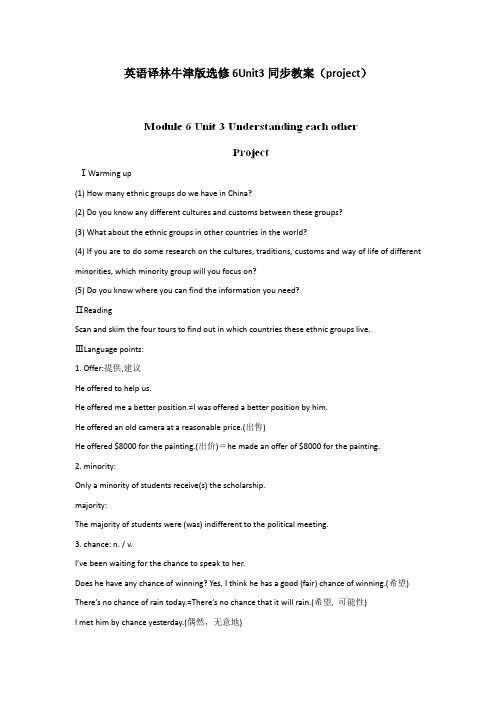
英语译林牛津版选修6Unit3同步教案(project)ⅠWarming up(1) How many ethnic groups do we have in China?(2) Do you know any different cultures and customs between these groups?(3) What about the ethnic groups in other countries in the world?(4) If you are to do some research on the cultures, traditions, customs and way of life of different minorities, which minority group will you focus on?(5) Do you know where you can find the information you need?ⅡReadingScan and skim the four tours to find out in which countries these ethnic groups live.ⅢLanguage points:1. Offer:提供,建议He offered to help us.He offered me a better position.=I was offered a better position by him.He offered an old camera at a reasonable price.(出售)He offered $8000 for the painting.(出价)=he made an offer of $8000 for the painting.2. minority:Only a minority of students receive(s) the scholarship.majority:The majority of students were (was) indifferent to the political meeting.3. chance: n. / v.I’ve been waiting for the chance to speak to her.Does he have any chance of winning? Yes, I think he has a good (fair) chance of winning.(希望) There’s no chance of rain today.=There’s no chance that it will rain.(希望, 可能性)I met him by chance yesterday.(偶然,无意地)I chanced to look out of the window and saw the accident.=It chanced that I looked out of the window and saw the accident.(偶然发生,碰巧)4. Opportunity:I lost the opportunity of studying abroad.I missed a good opportunity to give my opinion on it.While staying with the Inuit people you will ha ve the chance to ride on a…(状语从句的省略) Though working from morning till night, his father didn’t get enough food.When working in the factory, he was an advanced worker.While staying in Beijing, he came to see me twice.If playing all day, you will waste your valuable time.5. accountHe gave me a full account of his plan.(说明)I won’t be able to come on this account.(因为这个缘故)The trains were delayed on account of snow.(为..的理由)6. As well as:He speaks Spanish as well as English and French.His children as well as his wife were invited to the party.You might/may (just) as well do…You may as well know the truth.(不妨)7. Believe in:Do you believe in ghosts?(信仰)I believe him, but I don’t believe in him. (信任)Helen believes in jogging for her health.(认为…有益)Th e story is believed (to be) true. It’s believed that he has gone abroad.8. Base on:This story is based on facts.You should base your conclusion on/ upon careful research.9. Home:Is China the home of pottery?(发源地)The home of the kangaroo is Australia.10. meet with:I met with a traffic accident.(遭遇到)11. belong to: (无被动态)The car belongs to me.Used to do…/( be/get/become )used to doing (sth.)/be used to doHe used to swim in the river. (he doesn’t swim in the river)You will soon get used to getting up early.Pens are used to write.12. Hunt for:I hunted the room for the key.He’s hunting for a job.Ⅳ难句解析1. We offer you the chance to visit different minority cultures and experience for yourself their traditions, customs and way of life. (P46)[分析] 1)句子结构分析:此句的主干是We offer you the chance,后面是由and连接的两个不定式to visit ... and experience ...作定语,修饰chance。
- 1、下载文档前请自行甄别文档内容的完整性,平台不提供额外的编辑、内容补充、找答案等附加服务。
- 2、"仅部分预览"的文档,不可在线预览部分如存在完整性等问题,可反馈申请退款(可完整预览的文档不适用该条件!)。
- 3、如文档侵犯您的权益,请联系客服反馈,我们会尽快为您处理(人工客服工作时间:9:00-18:30)。
Ⅰ.单词拼写
1.When you hug someone, you put your arms around them and hold them tightly, for example, because you like them or are pleased to see them.
2.Mrs.Wang was unhappy because her husband forgot their wedding anniversary.
3.Pollution is a serious problem in major cities throughout the world.
4.I get up at the cry of the roosters early in the morning every day.
5.A bridegroom is a man who is getting married, or who has recently gotten married.
6.Mustard is yellow or brown, and is usually eaten with meat.It tastes hot and spicy.
7.A barbecue is a social gathering, usually held outdoors, at which food is cooked over an open fire.
8.These cats look exactly alike (十分相似的), so how can you tell which is which?
9.My mom is busy preparing rooms for the reception(接待) of guests.
10.Mr.Green got a present from his students at the end-of-term (学期末) ceremony.
11.The bride (新娘) looked beautiful and the whole ceremony went very well.
12.Jeff and David were in the back yard setting off fireworks(烟花).
13.He looks so familiar (熟悉的), but I can't remember his name.
14.In order to ensure (确保) success, we must make a complete and thorough plan.
Ⅱ.拓展词汇
15.greet v t.和某人打招呼(或问好)→greeting n.问候;招呼
16.congratulate v t.向(某人)道贺,祝贺→congratulation n.祝贺
17.permit v.允许,准许n.许可证→permission n.允许
18.prohibit v t.(尤指以法令)禁止→prohibition n.禁止;禁令
19.adjust v i. &v t. 适应,习惯;调整,调节→adjustment n.调整,调节
20.accustomed adj.习惯于;惯常的→accustom v.使习惯
21.celebration n.庆典;庆祝活动→celebrate v t.庆祝
[巧记单词]
Ⅲ.补全短语
1.adjust to适应
2.get/be/become accustomed to 习惯于
3.be familiar with 通晓;熟悉
4.be amazed at 对……感到吃惊
5.take off 脱下,除掉;起飞
6.be similar to 与……相似
7.on the one hand 一方面
8.do without 设法对付过去;
没有……也行
9.share/have sth. in common 有共同点
10.set off 燃放
1.[教材原句]Roosters are supposed to drive bad spirits away from the wedding ceremony, and hens are thought to ensure good luck for the marriage.
公鸡被认为能够把坏运气从婚礼上赶走,而母鸡被认为能保证给婚姻带来好运。
[句型点拨]本句为并列句,and连接两个并列分句,且两个并列分句均为简单句,第二个并列分句属于“sb./sth.+be+过去分词+不定式”结构。
[佳句赏析]The cowherd and the spinster, the lover stars in heaven, are said to meet on the Seventh Eve.
据说牛郎星和织女星在七夕相会。
2.[教材原句]It's quite funny watching the new foreign teachers trying to adjust to doing that.
看新来的外教努力适应这个动作的样子很有趣。
[句型点拨]本句中it为形式主语,真正的主语是动名词短语watching ...
[佳句赏析]It's funny seeing a man walk with his hands and head.
看见一个人倒立走路很滑稽。
